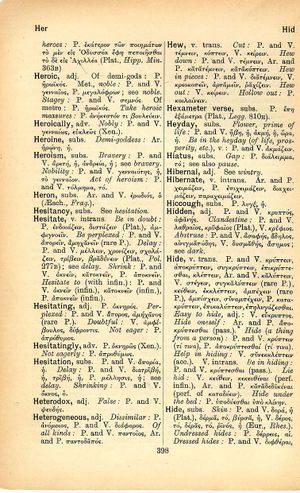heroine: Difference between revisions
From LSJ
ὥσπερ γὰρ ζώου τῶν ὄψεων ἀφαιρεθεισῶν ἀχρειοῦται τὸ ὅλον, οὕτως ἐξ ἱστορίας ἀναιρεθείσης τῆς ἀληθείας τὸ καταλειπόμενον αὐτῆς ἀνωφελὲς γίνεται διήγημα → for just as a living creature which has lost its eyesight is wholly incapacitated, so if history is stripped of her truth all that is left is but an idle tale | for, just as closed eyes make the rest of an animal useless, what is left from a history blind to the truth is just a pointless tale
m (Text replacement - "}}]]" to "}}]]") |
(2) |
||
| Line 9: | Line 9: | ||
{{Georges | {{Georges | ||
|georg=hērōīnē, ēs, f. ([[ἡρωΐνη]]), die [[Halbgöttin]], Heroine, Sing., Prop. 2, 2, 9: Plur. heroinae, Prop. 1, 13, 31 u. 1, 19, 13. | |georg=hērōīnē, ēs, f. ([[ἡρωΐνη]]), die [[Halbgöttin]], Heroine, Sing., Prop. 2, 2, 9: Plur. heroinae, Prop. 1, 13, 31 u. 1, 19, 13. | ||
}} | |||
{{LaEn | |||
|lnetxt=heroine heroines N F :: heroine (mythical) | |||
}} | }} | ||
Revision as of 03:30, 28 February 2019
English > Greek (Woodhouse)
subs.
Demi-goddess: Ar. ἡρῴνη, ἡ.
Latin > French (Gaffiot 2016)
hērōīnē,¹⁴ ēs, f. (ἡρωΐνη), demi-déesse, héroïne : Prop. 2, 2, 9 ; pl., Prop. 1, 13, 31 ; 1, 19, 13.
Latin > German (Georges)
hērōīnē, ēs, f. (ἡρωΐνη), die Halbgöttin, Heroine, Sing., Prop. 2, 2, 9: Plur. heroinae, Prop. 1, 13, 31 u. 1, 19, 13.
Latin > English
heroine heroines N F :: heroine (mythical)

